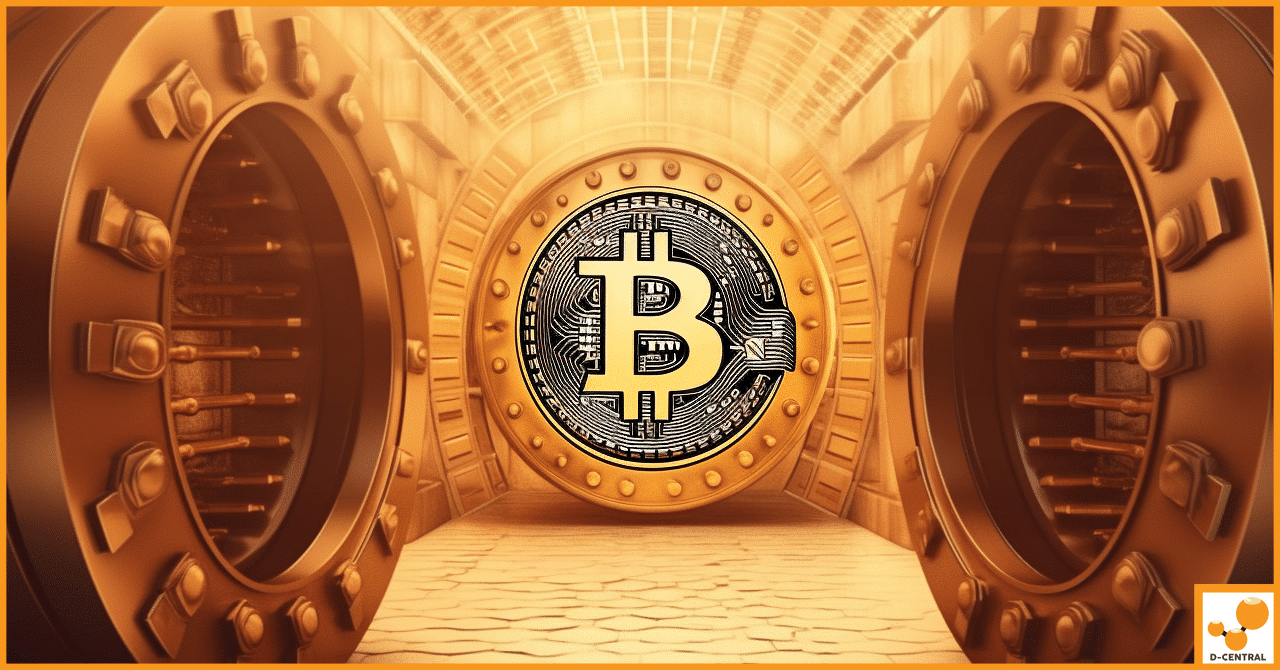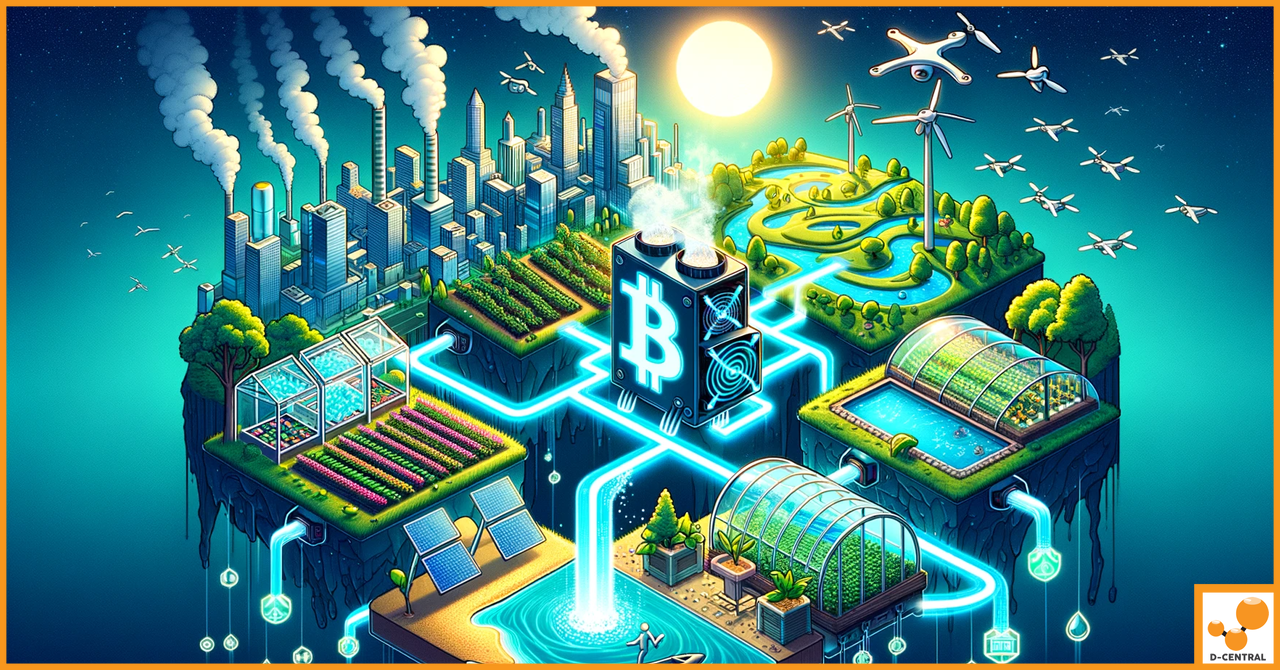
Decoding the Bitcoin Advantage: How It Outshines Stablecoins in Wealth Preservation
The world of digital currency has grown exponentially over the past decade, with various cryptocurrencies emerging and vying for supremacy.
4479 Desserte Nord Autoroute 440, Laval, QC H7P 6E2

In the dynamic world of cryptocurrencies, few processes have undergone as much transformation as Bitcoin mining. From its humble beginnings, where enthusiasts could mine using simple home computers, to today’s intricate landscape of specialized hardware and vast mining farms, the evolution of Bitcoin mining is a testament to the growing importance and complexity of the cryptocurrency ecosystem.
Mining is not just about creating new Bitcoins. It’s the backbone of the entire Bitcoin network, ensuring security, validating transactions, and maintaining decentralization. This process, while often misunderstood, plays a pivotal role in the stability and trustworthiness of the cryptocurrency world.
Enter D-Central Technologies, a beacon of expertise in this ever-evolving domain. As Canada’s largest ASIC repair center, D-Central has consistently demonstrated its leadership in the field, offering a wide array of Bitcoin mining services. From consultation to comprehensive mining support, D-Central Technologies stands as a testament to the blend of innovation and dedication required to navigate the intricate waters of Bitcoin mining.
As we delve into the world of cryptocurrencies, understanding the fundamentals of Bitcoin mining becomes paramount. But what exactly is Bitcoin mining? At its core, it’s the process by which new Bitcoins are created and, simultaneously, the method through which transactions are added to the public ledger, known as the blockchain. Miners use powerful computers to solve complex mathematical problems that validate groups of transactions, called blocks. Upon solving these problems, miners are rewarded with newly minted Bitcoins, incentivizing the process and compensating them for the energy and computational resources expended.
However, the role of miners extends beyond the creation of new coins. They are the guardians of the Bitcoin network’s security and integrity. By validating and adding transactions to the blockchain, miners prevent the double-spending problem, a critical issue where the same digital currency could potentially be spent more than once. This role is crucial in maintaining the trust and reliability that are foundational to the Bitcoin network’s success.
Yet, mining isn’t solely a philanthropic activity; it’s also a competitive business. Miners must balance their contributions to the network’s security with the pursuit of profitability. This balance is delicate, hinging on factors like electricity costs, the efficiency of mining equipment, and the current price of Bitcoin. As the Bitcoin reward for mining is halved approximately every four years—a phenomenon known as “halving”—maintaining profitability becomes increasingly challenging. Miners are perpetually seeking more efficient hardware and cheaper energy sources, all while navigating the Bitcoin market’s notorious volatility.
In this intricate dance between supporting the network and ensuring a return on investment, miners are both the backbone of the Bitcoin ecosystem and participants in a highly competitive marketplace. Their efforts, driven by the dual motives of profit and network health, continue to shape the landscape of cryptocurrency and blockchain technology.
Bitcoin mining, despite its foundational role in the cryptocurrency ecosystem, has not been without its share of controversies. As the process gained prominence and the Bitcoin network expanded, so did the scrutiny and skepticism surrounding its environmental and economic implications.
The media has often painted Bitcoin mining in a negative light, focusing on its substantial energy consumption. Headlines frequently tout the vast amounts of electricity mining consumes, likening it to the energy usage of entire countries. These reports, while not entirely unfounded, often lack context, leading to misconceptions about the true nature and impact of Bitcoin mining.
One of the most cited studies in this realm is the Cambridge study, which provided an in-depth analysis of the energy consumption associated with Bitcoin mining. While the study did highlight the significant energy usage, it also brought to light several overlooked aspects. For instance, a considerable portion of Bitcoin mining uses renewable energy sources, mitigating its carbon footprint. Additionally, the energy consumed by traditional banking systems and gold mining, when compared, puts Bitcoin’s energy consumption into perspective.
Furthermore, it’s essential to understand that the energy used in Bitcoin mining is not “wasted.” It’s a crucial component of the network’s security, making attacks economically unfeasible and ensuring the integrity of millions of transactions.
In the face of skepticism and misconceptions, it’s vital to approach the topic of Bitcoin mining with a balanced perspective. While there are undeniable environmental concerns, it’s equally important to recognize the innovations and efforts within the mining community to address these issues and the broader context in which Bitcoin operates.
The world of Bitcoin mining is not static. As with any industry, it has seen a continuous evolution driven by the twin engines of necessity and innovation. While the allure of earning Bitcoin remains a primary motivator, the landscape of mining has expanded to encompass much more than just the acquisition of cryptocurrency.
A significant force behind mining’s evolution is the relentless drive for efficiency. As the Bitcoin reward diminishes due to periodic halvings, and as competition among miners intensifies, there’s a pressing need to optimize every aspect of the mining process. This drive has led to advancements in hardware, with the development of more powerful and energy-efficient ASICs (Application-Specific Integrated Circuits). Innovations aren’t limited to hardware alone; there’s a continuous exploration of locations with cheaper electricity costs, better cooling solutions, and even the utilization of renewable energy sources. All these efforts converge towards a singular goal: reducing operational costs and maximizing yield.
Yet, in this quest for efficiency, one tool stands out as particularly crucial: profitability calculations. Mining is an investment, and like all investments, it requires careful planning and analysis. Miners need to consider various factors, from the upfront costs of hardware and infrastructure to ongoing expenses like electricity and maintenance. They must also factor in the potential rewards, which are influenced by Bitcoin’s market price, transaction fees, and block rewards. These calculations are not static; they need to be revisited regularly, adapting to the ever-changing variables that influence profitability.
In essence, Bitcoin mining today is a sophisticated operation, a far cry from its early days of home computers and hobbyist miners. It’s a testament to the industry’s resilience and adaptability, always innovating and optimizing, always looking beyond just earning Bitcoin.
In the realm of Bitcoin mining, innovation isn’t solely confined to optimizing the primary process of earning cryptocurrency. A fascinating and increasingly prevalent trend is the harnessing of the byproduct of mining operations, primarily waste heat, for secondary purposes. This approach not only maximizes the utility of the energy consumed but also presents a sustainable and environmentally conscious facet of mining.
At the heart of this trend is the concept of dual-purpose mining. Traditional mining operations, especially those using powerful ASICs, generate a significant amount of heat. Instead of letting this heat go to waste, forward-thinking miners have found ways to repurpose it, turning what was once a drawback into a valuable asset.
Bitcoin Mining Tulips: One of the most innovative applications of this concept can be seen in the Netherlands, where the excess heat from Bitcoin mining operations is used to warm greenhouses. These greenhouses, in turn, provide the ideal environment for cultivating tulips, a significant export product for the country. This symbiotic relationship not only ensures efficient use of energy but also offers a sustainable solution for agricultural needs.
Farmers Embracing Mining: The agricultural sector continues to benefit from the ingenuity of the mining community. Farmers, always on the lookout for efficient heating solutions, have tapped into the waste heat from mining rigs. This heat is used for a variety of purposes, from incubating lambs to ensuring optimal temperatures for food dehydrators. Such applications underscore the versatility of the energy produced by mining operations.
Bitcoin Mining Pools: Moving away from agriculture, another intriguing application is the use of waste heat to warm swimming pools. Instead of relying on traditional heating methods, some pool owners have integrated mining rigs into their infrastructure. The result? A warm pool that’s heated in an eco-friendly manner, all while earning Bitcoin.
Grid Stabilization: On a larger scale, Bitcoin mining can play a pivotal role in stabilizing local energy grids. Mining operations, with their consistent energy consumption, can act as a counterbalance to fluctuations in energy supply, especially from renewable sources. By adjusting their energy consumption in response to grid demands, miners can help ensure a stable energy output, benefiting entire communities.
In conclusion, the secondary uses of Bitcoin mining highlight the industry’s adaptability and commitment to sustainability. By harnessing waste energy, miners are not only optimizing their operations but also contributing positively to various sectors and the environment at large.
As the prominence of Bitcoin mining has surged, so too have concerns about its environmental impact. The energy-intensive nature of the mining process, combined with the global scale of operations, has placed the industry under the microscope, with critics pointing to its carbon footprint and potential environmental degradation. However, the narrative is more nuanced than often portrayed, with significant strides being made towards ethical and sustainable mining practices.
Addressing Energy Consumption Concerns: One of the primary criticisms levied against Bitcoin mining is its substantial energy consumption. While it’s undeniable that mining, especially at its current scale, requires vast amounts of power, it’s essential to contextualize this consumption. First, not all energy used in mining is “wasted.” The energy expended ensures the security and integrity of the Bitcoin network, validating transactions and preventing fraud. Moreover, when compared to traditional financial systems, which include banking infrastructures, ATMs, and data centers, the energy consumption of Bitcoin mining can be seen in a different light.
The Move Towards Renewable Energy Sources: Recognizing the environmental concerns, many in the mining community have taken proactive steps to mitigate their carbon footprint. A significant trend in this direction is the shift towards renewable energy sources. Solar, wind, and hydroelectric power are increasingly being harnessed to power mining operations. These renewable sources not only reduce greenhouse gas emissions but also offer cost benefits in the long run, making them an attractive option for miners. Regions with abundant renewable energy, like parts of Scandinavia and China’s Sichuan province, have become hotspots for eco-friendly mining operations.
Mining’s Positive Environmental Contribution: Beyond merely reducing its negative impact, Bitcoin mining has the potential to contribute positively to the environment. As previously discussed, the secondary uses of mining, such as harnessing waste heat for agricultural and heating purposes, offer sustainable solutions that benefit both the environment and the community. Additionally, by providing a consistent demand for renewable energy, mining operations can incentivize the development and expansion of green energy infrastructures.
In conclusion, while challenges remain, the trajectory of Bitcoin mining is clear: a move towards more sustainable, ethical, and environmentally-friendly practices. The industry’s adaptability and commitment to innovation underscore its potential to not only coexist with but also contribute positively to our planet’s well-being.
In the vast landscape of Bitcoin mining, certain names stand out, not just for their contributions but for their vision and commitment to shaping the industry’s future. D-Central Technologies is one such name, a beacon of expertise and innovation in the world of cryptocurrency mining.
An Overview of Services Offered: At the heart of D-Central Technologies is a suite of services tailored to cater to every need in the Bitcoin mining process. Whether you’re a seasoned miner looking for state-of-the-art ASIC repairs or someone new to the scene seeking comprehensive mining support, D-Central has you covered. Their offerings span a wide spectrum, from consultation to sourcing of mining hardware, from hosting mining operations to maintenance training. But it’s not just the breadth of services that sets them apart; it’s the depth of expertise and dedication they bring to each task, ensuring that clients receive the best solutions tailored to their unique needs.
The Importance of Staying Updated: The world of Bitcoin mining is in constant flux, with new technologies, regulations, and market dynamics emerging regularly. In such a rapidly evolving industry, staying updated isn’t just a luxury; it’s a necessity. D-Central Technologies recognizes this imperative. Their commitment to continuous learning, research, and adaptation ensures that they remain at the industry’s forefront, always ready to offer clients the latest insights, tools, and solutions.
The future of Bitcoin mining is exciting, filled with possibilities and innovations. If you’re looking to navigate this dynamic landscape with a trusted partner by your side, look no further. Dive deeper into the world of mining with D-Central Technologies. Your journey to the future of mining starts here.
As we reflect on the journey of Bitcoin mining, it’s evident that its trajectory is one of continuous evolution and growth. What began as a pursuit for mere profit has transformed into a multifaceted industry that prioritizes sustainability, innovation, and community impact. The days of viewing mining solely as a means to earn Bitcoin are behind us. Today, the industry stands at the crossroads of technology, environment, and societal benefit, offering solutions that extend far beyond the digital realm.
The innovations we’ve explored, from harnessing waste energy for agricultural purposes to the push for renewable energy sources, are just the tip of the iceberg. As technology advances and the global community becomes more interconnected, the potential for Bitcoin mining to drive positive change is immense.
To our readers, the future of Bitcoin mining is as much in your hands as it is in the hands of industry leaders. Staying informed, embracing innovation, and considering the broader impacts of your mining activities are not just responsibilities; they’re opportunities. Opportunities to shape an industry, to contribute to a sustainable future, and to be part of a movement that redefines the boundaries of what’s possible.
In the ever-evolving world of Bitcoin mining, the only constant is change. And as we look ahead, it’s clear that the best is yet to come.
What is Bitcoin mining?
Bitcoin mining is the process through which new Bitcoins are created and validated, and transactions are added to the public ledger, known as the blockchain. It plays a vital role in the security, validation of transactions, and maintenance of decentralization of the Bitcoin network.
What roles do miners play in the Bitcoin network?
Miners in the Bitcoin network serve two crucial roles. They are responsible for the creation of new coins and ensuring security by validating and adding transactions to the blockchain, thus preventing the double-spending problem. They also participate in a competitive business environment where they aim to ensure profitability while contributing to network security.
What are some of the controversies surrounding Bitcoin mining?
Bitcoin mining has been subject to controversies due to its significant energy consumption. While critics focus on its environmental impact, proponents argue that considerable energy from mining is from renewable sources, and the consumed energy ensures the network’s security and validity of transactions.
What are some of the innovative trends in Bitcoin mining?
Innovations in Bitcoin mining include the development of more energy-efficient hardware, exploration of locations with cheaper electricity costs, better cooling solutions, utilization of renewable energy, and secondary use of waste heat from mining operations for various purposes, including agriculture and heating.
What strides have been made towards sustainable Bitcoin mining?
Towards sustainable Bitcoin mining, considerable efforts have been made to use renewable energy sources to power mining operations. Bitcoin mining has also seen the harnessing of waste heat for secondary purposes, contributing to environmental benefits and optimal use of energy consumed.
What services does D-Central Technologies offer?
D-Central Technologies offers a comprehensive range of services tailored to Bitcoin miners’ needs. These include consultation, sourcing of mining hardware, hosting mining operations, ASIC repairs, maintenance training, and comprehensive mining support and outsourcing solutions.
DISCLAIMER: D-Central Technologies and its associated content, including this blog, do not serve as financial advisors or official investment advisors. The insights and opinions shared here or by any guests featured in our content are provided purely for informational and educational purposes. Such communications should not be interpreted as financial, investment, legal, tax, or any form of specific advice. We are committed to advancing the knowledge and understanding of Bitcoin and its potential impact on society. However, we urge our community to proceed with caution and informed judgment in all related endeavors.
Related Posts

The world of digital currency has grown exponentially over the past decade, with various cryptocurrencies emerging and vying for supremacy.

In the dynamic world of cryptocurrency mining, Antminer users face the critical task of maintaining their mining hardware to ensure

Welcome to the world of efficient and profitable home Bitcoin mining! In this comprehensive guide, we’ll explore how leveraging natural